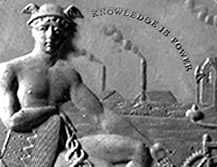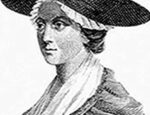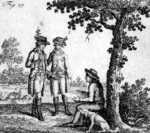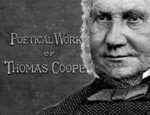Description
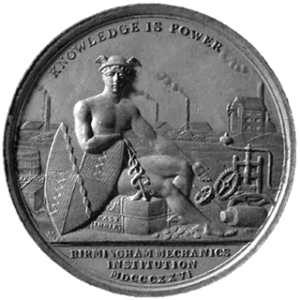 See the flying god Mercury adorning a prize medal struck to commemorate the opening of the Birmingham Mechanics’ Institute in January 1826. Its avowed purpose was ‘the Promotion of Knowledge among the Working Classes by means of Elementary Schools, a Library and Lectures on the different branches of Art and Science’.
See the flying god Mercury adorning a prize medal struck to commemorate the opening of the Birmingham Mechanics’ Institute in January 1826. Its avowed purpose was ‘the Promotion of Knowledge among the Working Classes by means of Elementary Schools, a Library and Lectures on the different branches of Art and Science’.
The medal, struck in white metal, bears the inscription Knowledge is Power. Mercury sits in an industrial landscape, with factories and tall chimneys spewing out smoke behind him, and a variety of artisanal tools lovingly outlined on the lower right. The Birmingham working men’s economic relationship with the British Empire, on the profits of which their own opportunities for self-improvement ultimately depended, is loudly signalled by the inscriptions on the two coffers, ‘Africa’ and ‘East Indies’. Coins are strewn at Mercury’s feet near the ‘East Indies’ chest, on which he sits and nonchalantly rests his caduceus, a recognised symbol of trade and negotiation.
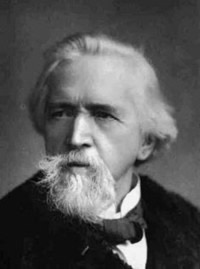
These medals were won by junior members who excelled in study, and their distribution is said to have ‘excited a valuable spirit of emulation’. The Institute’s courses were dominantly scientific, but it also offered lectures on Arts subjects, including Latin: in 1834 a class was run called
‘Introduction to the Latin Language’, with a textbook written by a young member named Joshua Toulmin Smith who later became a prominent political theorist and editor of Thomas Keightley’s popular History of the Roman Empire. In 1836 Toulmin Smith also wrote ‘Philosophy among the ancients’, almost certainly for delivery at the Institute.
By the 1840s, the Institute failed, mainly because its membership was divided over supporting the aims of the Chartist movement and the use of violence. One of its most important instructors was George Jacob Holyoake, reformist and inventor of the term ‘secularism’. The son of a Birmingham whitesmith, Holyoake had begun work at the age of eight in a local foundry. He started evening classes at the Birmingham Mechanics Institute in 1836, where he first came under the influence of the ideas of Robert Owen and joined the Chartist movement.

